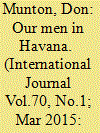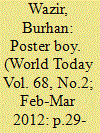| Srl | Item |
| 1 |
ID:
082931


|
|
|
|
|
| Publication |
2008.
|
| Summary/Abstract |
This paper critically examines the different ways that analysts and policy-makers have assessed the future shape of the Cuban regime following the future passing of its long-time revolutionary leader, Fidel Castro. Certainly, from a social science perspective, the future of Cuba after Fidel Castro is open. On the other hand, different, often mutually inconsistent scenarios for regime transition suggest that Cuba's future is over-determined. Both features of social reality - openness and over-determination - create space for visions, ideologies, strategies, and other normative interventions designed to impose a particular cognitive and political order on social reality. While social science should try to include such 'subjective factors' in its objective account, it must maintain a critical distance from the normative closure and hopeful predictions that ideologies and strategies of necessity imply. Based on an analytical distinction between relatively stable systems and rapidly changing systems, this paper identifies and goes on to discuss the major systems of primary relevance for Cuba's future.
|
|
|
|
|
|
|
|
|
|
|
|
|
|
|
|
| 2 |
ID:
087541


|
|
|
|
|
| Publication |
2009.
|
| Summary/Abstract |
At the behest of Washington, Canadian diplomats secretly gathered intelligence in Cuba during the 1960s, sometimes in collaboration with British counterparts. They did so despite the lack of a Canadian foreign intelligence tradition and despite the fact that Canada maintained diplomatic and trade relations with the Castro government, often in the face of American criticism. The intelligence studies literature does not much explore such examples of intelligence cooperation let alone provide much basis for theorizing. The present article attempts to explain this case using both realist theory and liberal-constructivist theory. Canada's cooperation can be explained in part by Cold War-related security concerns and in part by a desire to meet the norm of quid pro quo that permeates international intelligence liaison.
|
|
|
|
|
|
|
|
|
|
|
|
|
|
|
|
| 3 |
ID:
137139


|
|
|
|
|
| Summary/Abstract |
Diplomats based at the Canadian embassy in Havana conducted extensive foreign intelligence operations in Fidel Castro’s Cuba from the early 1960s through the early 1970s. They collected human intelligence of both a political and military nature, using covert as well as overt means. They did so generally at the behest of the United States, and undertook specific “tasked” operations on request from the State Department and the US intelligence community. The diplomat-spies also collaborated operationally with United Kingdom personnel. This article represents the first detailed survey of the Cuba operations and attempts to place Canada’s foreign intelligence program in the context of its relations with the United States and of Canadian foreign policy generally.
|
|
|
|
|
|
|
|
|
|
|
|
|
|
|
|
| 4 |
ID:
123157


|
|
|
| 5 |
ID:
117426


|
|
|
|
|
| Publication |
2012.
|
| Summary/Abstract |
The Cuban missile crisis remains one of the most intensely studied events of the twentieth century, and which engages the attention of scholars from a variety of disciplines. Lessons learned by American practitioners and academics contributed to the conduct of American foreign policy in the 1960s and to academic understanding of nuclear deterrence, nuclear crises and crisis management in general. Nearly 50 fifty years of scholarship have generated new insights and understanding. From the 1980s, study of what in Moscow was termed the Caribbean crisis was informed by access to Soviet officials and Soviet archives, and became the forefront of the 'new historiography' of the Cold War. This collection reviews how various texts inform our understanding and how new interpretations and/or new sources of information have overtaken (or indeed validated) the original analysis. This article provides an overview of this endeavour and an answer to the question of whether we should continue to study the Cuban missile crisis.
|
|
|
|
|
|
|
|
|
|
|
|
|
|
|
|